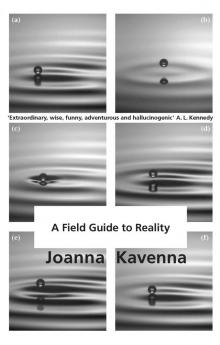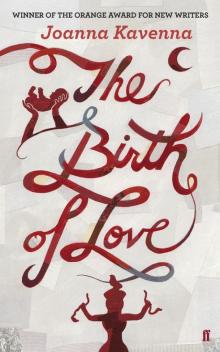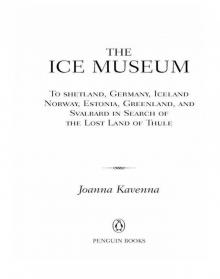- Home
- Joanna Kavenna
A Field Guide to Reality Page 3
A Field Guide to Reality Read online
Page 3
‘Oh, yes,’ said Anthony. ‘Yes, a good point.’
‘And they say academics lack common sense,’ said O’Donovan. ‘Here we are, the serried professionals of a supposedly eminent college, and we require assistance in our deductive processes from a—’
‘Waitress,’ I said.
He waved a hand at me, as if he hadn’t liked to sully me, or indeed himself, with such a word. Anthony was speaking into the phone. That elicited, after a brief pause, the lugubrious porter from the lodge. He came in and for a while he dolefully smacked the lock with a hammer. ‘Very cheap mechanism,’ he said. The lock fell apart.
Even Lady Petrovka stood. There was a pause while we all looked at the box. Then I lifted the lid, as everyone leaned forward.
‘Is it?’ said Petrovka, an accidental exhalation. ‘Could it?’
But it wasn’t. It couldn’t.
*
The box was empty. There was no book, and no grand and final theory of Reality. No Field Guide. Nothing but air and dust. The absence of anything had a significant effect on everyone. The anticlimax first conveyed the porter from the room, pursued by Yorke, who wanted to thank him. Then everyone reconvened at the chest and marked their astonishment at first with total silence and then with rage and mutual accusation.
‘Where the bloody hell,’ said O’Donovan, ‘is it?’
‘It isn’t here,’ said Petrovka. ‘That is all. And if not here, it is somewhere else. And thus, it can be found.’
‘Have you already moved it?’ said O’Donovan, to Anthony, who looked irritated and made a noise to indicate that of course he hadn’t.
‘Why would I?’ he added. His cheeks were slightly flushed.
‘Well then, what the bloody hell has happened to it?’ said O’Donovan.
‘Calm down, Patrick. Your career will survive, you know,’ said Petrovka. ‘It’ll limp on. Churchwood won’t actually fire you.’
‘No, I’ll tell him to fire you, instead,’ said O’Donovan. They looked at each other with naked mutual loathing, and then Anthony said, ‘Solete must have changed his mind, just before he died, and moved it.’
‘Nonsense, he wasn’t like that,’ said O’Donovan. ‘Some bastard has taken it.’
‘Well, which bastard?’ said Petrovka. ‘That’s the only important question.’
‘What will you do with it, when you find it?’ I said. I was genuinely curious. Petrovka gave me a considering look, then went to sit on her chair again. Had you arrived into the room at that moment, you would have seen Petrovka, apparently at ease, and O’Donovan with his head almost in the fire and Anthony looking blank and worried and me – I don’t know what I was doing. I could hardly feel the loss of something I never expected to have. But I was annoyed, that the box with my name on it was so conspicuously empty.
‘So, I assume no one has any objections to Eliade taking away this box,’ said Anthony.
‘Christ no,’ said Petrovka. She stood, putting on her gloves. She gestured vaguely at the clock. ‘Take anything you like. I should be off.’
‘Oh well, nice to meet you,’ I said.
‘Oh yes, you too,’ she said. ‘Intriguing business.’
Petrovka went away. I imagined her strolling down the corridor, dismissing the whole mess. An old professor, who went insane, and thought he had plumbed the depths of the universe, and who, instead, left a vacant box! And the poor woman who trooped into the college, expecting to receive a great prize, and went away with nothing. It was an anecdote for High Table, at least.
Now O’Donovan was muttering about a book he had to write, and the draconian regulations of the library. Just too many students as well, he was saying.
‘Eliade,’ he said, shaking my hand. He talked for a while. He was painstakingly affable. Do hope I didn’t offend, and thanks so much for coming in. Very fond of Solete. Knew him for years. ‘Would you like any other of his books, effects and so on? A memento or two?’
I told O’Donovan I would be fine. ‘Knowing Solete as I did,’ he said, from the doorway, ‘I think it was just a joke. He was essentially a comedian.’
He went away.
Academics! I thought. Yorke was sorting through a pile of papers on the desk, a series of scraps, with headings like ‘The Pinecone’ and ‘Why the Sky is Black’. They looked like rough notes, to be incorporated into a final work, or a vanished book.
‘Are you rushing off too?’ said Yorke, as I gathered my coat and scarf.
‘I have to go and work, in the café,’ I said. ‘What about you?’
Did I want another cup of tea? No no, I really couldn’t.
‘What will you do, about the book?’ he said.
‘Well, I don’t know.’
‘You could search for it in his house?’
‘I might, yes.’
‘I could help, if you like? Just let me know. My room is across the quad. The porter will show you. Or, my number – well, just call the college. Anytime – if I can help.’
I thanked him, then I left in a hurry, I really was late. He waved his hand to me, in an awkward way, and went back to leaning over the desk.
I came to Oxford on the advice of my mother. In those days I really listened to her. Then it became clear, life was not her specialist subject after all. She was clinging on, like anyone else. Like everyone. Spilling out theories. Still, at the time – in the days when her words fell as exhortations from a deity, adamantine, to be obeyed, I heard her saying, ‘Thou shalt go to Oxford.’ She thought the atmosphere would lift me up, I would be transformed. Osmosis. Or virtuous contagion. I’d catch cleverness, like a desirable malady. All her years of disappointment – erased!
If she’d been rich, then things would have been better, she often said. But she really wasn’t. My father, meanwhile, went to a random office, annihilated himself in the required way, head bowed. He was mostly silent – my mother was still raging urgently. She had a piece of paper – This is where you have to work, she said – the Tradescantian Ark Museum – here – Jeremiah Tradescant began it, some time in the remote past and now –
I took the piece of paper – it said:
*
A Babylonian vest
Eggs from Turkie, one given for a Dragons egge
Easter egges of the Patriarchs of Jerusalem
Two feathers of the Phoenix Tayle
The claw of the bird rock, who is able to trusse an elephant
Dodar from the Island of Mauritius, it is not able to flie being so big
Hares head, with rough horns three inches long
Toad fish and one with prickles
Divers things cut on plum-stones
A cherry stone, upon one side St. George and the Dragon, perfectly cut and on the other side eighty-eight emperors’ faces
The figure of a man singing and a woman playing on the Lute; the shadow of the worke being David’s Psalms in Dutch
A brazen-balle to warm the nunne’s hands
Blood that rained in the Isle of Wight, attested by Sir Jo Oglander
A bracelet made of the thighes of Indian flies
*
‘The original contents of the Tradescantian Ark,’ said my mother. ‘Tradescant collected them . . .’
I loved the sound of these words. I wondered what it would be like to hold such curios, and I thought a great deal about this man Tradescant and why, and how, he had amassed them. I learned the list off by heart, and then I went to see Dr Canterbridge and Professor Roberts. They were a kindly pair, but I didn’t know what to say to them. Afterwards, I went down the steps of that beautiful place and I knew I didn’t stand a chance. They were tactful as well, Canterbridge and Roberts, and afterwards they sent me a kind euphemism, about how I had very nearly won them over, despite everything, and how they wished me all the best.
*
So instead I got a job at the Tradescantian Museum café, in the basement. This museum was on St Giles. I was running there, passing the blurred features of Pie Hall, a few gargoyles, swaddled, past the
Great Library – so many books, their pages mottled with age. Normally when I arrived at the Museum I went upstairs and stared at Tradescant’s Ark, revealed in little glass boxes. But today I didn’t have time. I had to go and serve coffee and ladle food onto plates and hand them to – anyone. Everyone. As I rushed into the kitchen the cook was already raging mad.
‘Get the stuff out now. It’s going cold!’
I went to my allocated place, and started serving.
‘Beans sir? Chips or peas?’
Milk with your coffee? Sugar with your beard? Marmalade with your air of venerable antiquity?
Sir? Sir?
Today there was a persistent theme. Everyone had something to contribute. ‘The mist,’ said the woman with a green pullover and a couple of kids in tow; ‘The mist,’ said a pair of students to each other, and how Harry fell off his bike on the Cowley Road, poor fool . . .
Bevin, the manager, was frantic, he didn’t like delays, he had fifteen plates to serve and his employees were as late and idle and useless as ever, the food was going cold and people kept complaining. The mist swirled beyond the windows, but the room was candle-lit, a fire burnt in the grate. The sun set slowly, the mist was stained orange . . . purple . . . black. I went to throw some rubbish out, I stood in the turgid night, listening to the hum of traffic, I thought of the many dead, tried not to think.
When I looked up, I couldn’t see the stars.
I went back inside and as I closed the door behind me I realised my heart was thumping, I had started to sweat. But why?
*
I often found that I was observing the transient residents of the café, as they rustled papers or waited nervously for their friends or lovers. It was in this place that I first met Solete. He had a distinct routine; he came into the café each morning at eleven a.m. and stayed until the lunchtime rush began, at one p.m. The café was in an ancient vault so the noise rolled around like thunder. Solete seemed not to notice. He had a small notebook and he wrote copious notes in a crabbed archaic script, something more gothic than copperplate. He wrote quickly and he seemed to be entirely absorbed in his labours.
When you work in a café you are transfixed by the weird routines of regular customers and how in general we cleave to repetitive protocols. Of course your own day is repetitive because the same meals must be served at the same times, and people want coffee and croissants in the mornings and then strangely not in the evenings and they want soup at lunchtime but never at breakfast. The same people emerge at the same time each day, with very slight discrepancies. Then there are the freak occurrences, anomalies that distinguish one small day from the next. The man who weeps loudly in the corner and the old woman who has dyed her hair pink and green, and the boy in the buggy who squawks like a parrot and so on. These interruptions into the general order allow you at least to refer your day into anecdote, so if anyone is kind enough to ask you can say, ‘Yes, today a boy squawked like a parrot,’ rather than merely oppressing them with ongoing recurrent minutiae that they can imagine anyway.
So Solete was a ritual presence, and yet he was sufficiently odd to be interesting every day. He was thereby intrinsically paradoxical and presumably impossible. Despite his logical unlikelihood he turned up every day, and he was consistent and extraordinary at the same time. Each day I served him two strong coffees and a bowl of porridge and smiled politely, and he was equally polite, or perhaps even more so. We were nothing to each other, of course, except two sides of a Janus head, youth and age, or insignificance and significance, or half-formed failure and full-formed success and so on. Then my father died. It was a dreadful shock, and indeed so great was the shock that no sooner had the hospital wheeled my father away to the morgue than I collected all his suddenly extraneous belongings and simply took them back to Oxford, and went into work as usual the following day. I didn’t really know what else to do. Of course, a death brings insane torrents of bureaucracy, but I couldn’t face embarking on them at first, I was too tired and I couldn’t believe they were really necessary, because, even though I had seen it, watched life ebb from my own father’s eyes, I couldn’t believe my father was actually dead and assumed at times that what had plainly occurred must be a nightmare from which I would soon awake. Despite this, all that day I was afflicted by sudden recollections of my father, lying like an injured animal on his side, with his eyes half-closed, gasping for breath, and how this was a peaceful end, I was fortunate, and he was fortunate, and yet each time it felt as if someone had stabbed me through the heart. I couldn’t stop crying; all day I served tables with tears running down my face.
People are kind, often, and yet they are busy, always, and so no one really noticed, and that was fine and even preferable. When I arrived at Solete’s table, however, he glanced up, which was unusual, and noticed me. Of course then I was embarrassed, and wiped my face and turned abruptly away. I became very busy, moving cutlery, but then I heard him saying something which I didn’t understand. I asked him if he was talking to me (or just muttering crazily to himself ) and he said, yes, of course. ‘But don’t worry,’ he added. ‘You’re busy, I’ll write it down for you. Catullus.’ When I was called away, he nodded at me, and when it was one p.m. and time for him to depart he walked past me and handed me a piece of paper.
multas per gentes et multa per aequora vectus
advenio has miseras frater ad inferias
ut te postremo donarem munere mortis
et mutam nequiquam alloquerer cinerem
quandoquidem fortuna mihi tete abstulit ipsum
heu miser indigne frater adempte mihi
nunc tamen interea haec prisco quae more parentum
tradita sunt tristi munere ad inferias
accipe fraterno multum manantia fletu
atque in perpetuum frater ave atque vale
Which he had considerately translated for me, as there wasn’t the slightest hope of me translating it myself:
Through many nations and over many seas have I travelled,
To you, brother, for these wretched funeral rites
so that I might bring you a final tribute
and speak in vain to silent ash,
Since Fortune has carried you away from me
Alas, poor brother, taken away from me,
Leaving me to honour you with the old rites
As it is from generation to generation
Take from my hands these sad gifts as I weep brotherly tears
And forever, brother, hail and farewell . . .
After that we often talked and Solete told me this was a time for contemplation of the departed and I must be alone with my thoughts. Otherwise I would be overwhelmed. I was overwhelmed already, I had inadvertently proved his theory. As he spoke to me I noticed that he had grey-blue eyes; his general expression was so compassionate that I could scarcely look, afraid of blurting out some inner carnage and dissolving entirely. His hands were long and slender and the skin was so translucent that they looked blue. I explained that there were occasions, now for example, when the sorrow was so harsh and visceral that I felt as if I was being disembowelled and this sensation of acute pain simply made me cry.
‘Alas,’ he said. ‘This condition of mourning becomes almost constant as you become more established in life and by the time you reach my age almost everyone you love has died. For example, it is nearly twenty years since my wife died, and that is a very long time, and so I mourn and miss her but somehow I barely remember her. Sometimes I think I mourn a deceptive memory of her, something I am clinging onto, salvaged from photographs.’
I said I was so sorry about his wife. But he didn’t seem miserable. He was quiet and composed. His hands were clasped on his notebook. ‘Her name was Asta Rose,’ he said. ‘Isn’t that a beautiful name?’
I said it was.
‘Asta means beloved,’ he said. ‘She was a professor at the university, as well, she worked on cosmology and astrophysics.’ Solete was a philosopher, he explained. So together they had encompa
ssed the dying past and the unknown future. And yet, the stars are the past anyway, I knew that didn’t I? Billions of years old. The past beyond humanity.
‘My wife,’ said Solete, ‘always said that once summoned, life always lives, in some way, in particles, and the revelations of quantum physics are that we are eternal, if we only alter the concept of what “we” must mean.’
‘It hardly helps with death,’ I said. ‘Quantum particles. You want the person, not the particles. If they are elsewhere that’s fine but you can’t find them. Speak to them.’
‘I know,’ he said. ‘I understand.’ And I believed him. He was the only person in the café who didn’t make me angry somehow; all that week I had been furious with everyone. Something about his inner peace – without oblivion, or bravado – consoled me, just a little.
*
Today everything was so ordinary, just the thrum of conversation, words drifting through the warm and well-lit room, the clatter of plates, knives scraping. For a long time I was busy, moving food, smiling, accepting tips and saying thank you nicely, and Bevin was looking tense, the worst sort of look for him, any moment he would explode. People started gathering their bags, coats, scarves, I willed them to go.
I was deeply surprised when, at ten p.m., Yorke came in. He moved towards me, as I struggled with a tonne of ill-assorted crockery. I felt embarrassed and exposed and I felt as if he would look down on me, but why? And furthermore, why should I care what he thought?
‘There are a few further things I need to, er—’ he was saying. Then he noticed that Bevin was glaring at him from the door to the kitchen, looking as if he might come over any moment and scream in his face.
‘Who is that man?’
‘My boss.’
‘When do you finish?’
‘In an hour.’
With another glance at Bevin, Anthony ordered a glass of wine. Bevin was busy morphing into an archetype representing Fury but then, it was a cafe, it served wine – what else could he do?
I was meant to be flicking crumbs away with a dishcloth and scouring pans in the kitchen. All sorts of drab and crucial tasks awaited me but still I sidled over with the wine and then I pretended to be clearing things away, putting chairs on tables.

 A Field Guide to Reality
A Field Guide to Reality Inglorious
Inglorious The Birth of Love
The Birth of Love The Ice Museum
The Ice Museum